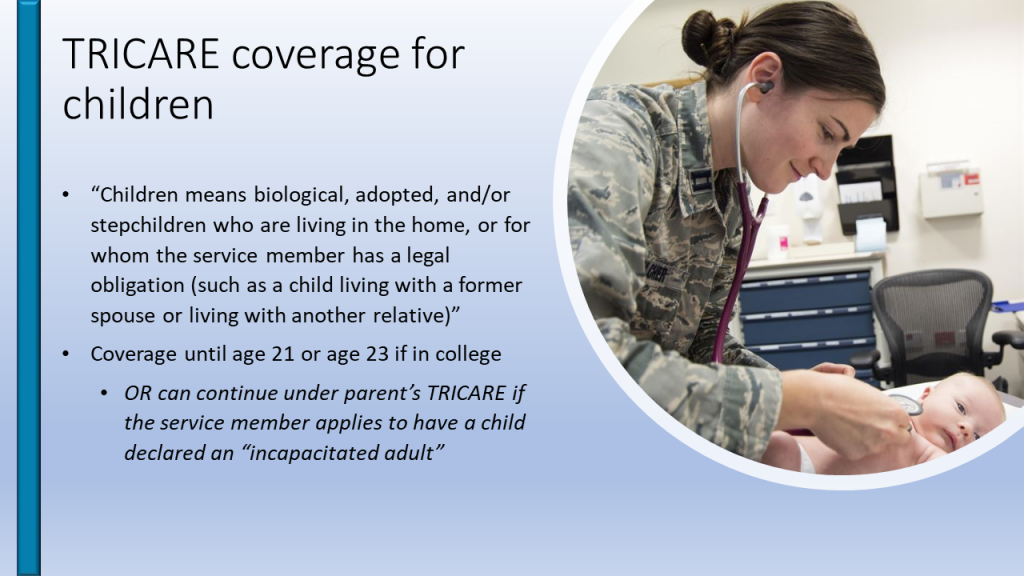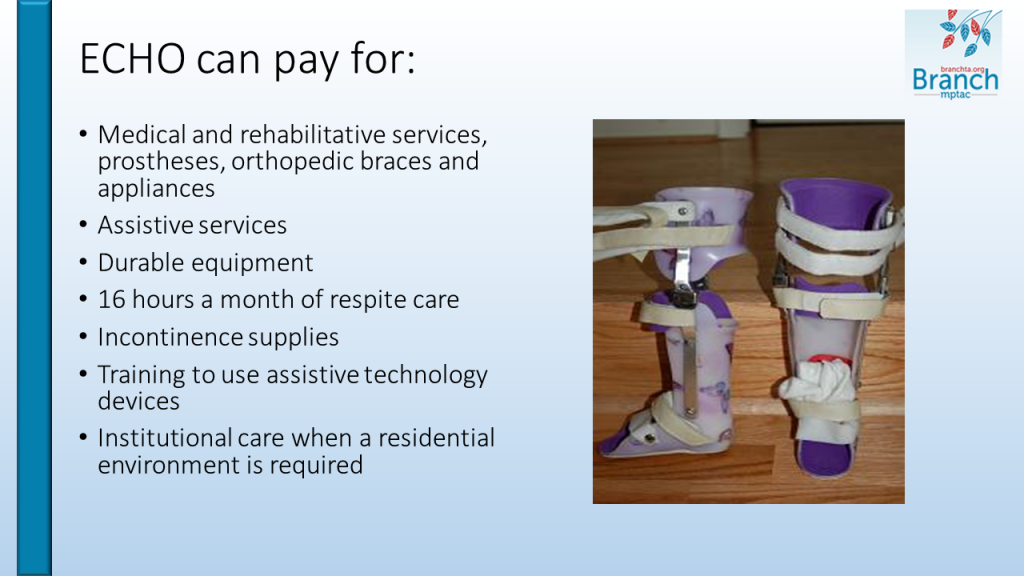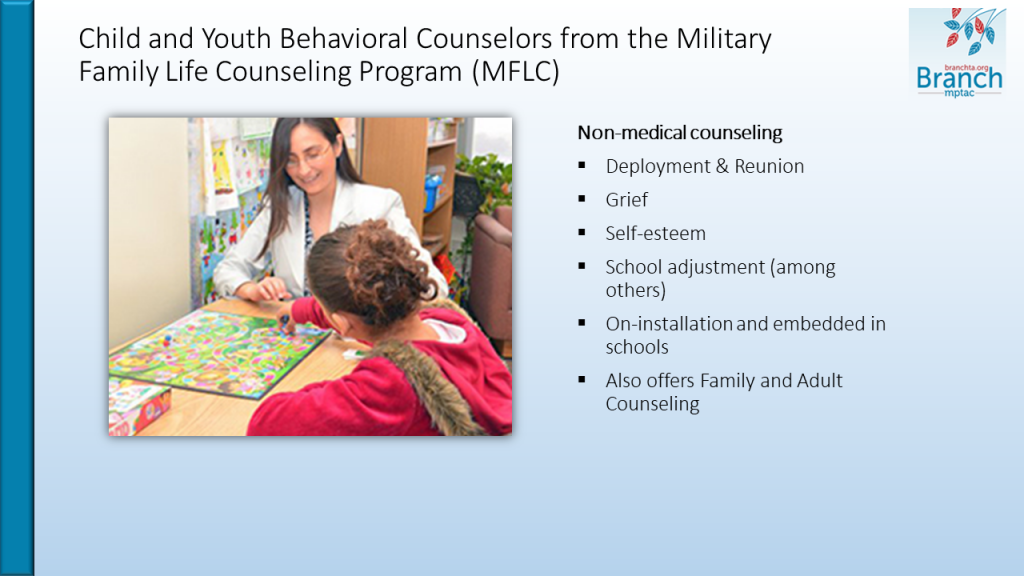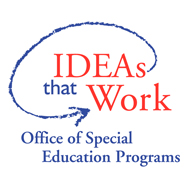On October 23, 2019, OSEP published a letter to “Anonymous” about the provision of compensatory education, as part of a complaint resolution, after a family relocates to a new state. This informal guidance can be useful to highly mobile military families.
Continue reading “Compensatory Education and Relocating Families”Resources
E-Learning Modules for Staff Development
These quick modules are perfect for individual staff self-directed learning, on-boarding new staff (see Easy Branch Orientation and Guide to Staff Training for suggested order), or as a webinar for a group. A script is included via the “Notes” page view, supplementing the slide text and images with additional information. We’ve included a link to a quick learning quiz at the end of the module, covering key points. Staff get instant feedback at the end of the quiz; they can review the module and take the quiz as many times as they wish to solidify their learning.
TRICARE-Healthcare for Military Families

By the end of this e-learning module, you’ll have found out why it’s important to know about this military healthcare program and learned how TRICARE benefits may affect or support special education services.
The ECHO Program and ABA for Military Families

This module is a basic introduction to two important military benefits for families you help. You will understand what benefits are available, who is eligible, and the distinction between these benefits and school services under IDEA.
ECHO PROGRAM AND ABA MODULE: CLICK HERE
Mental Health Resources for Military Families

By the end of this e-learning module, you’ll be familiar with mental health resources available for active duty, reserve, and veteran military children and youth. You will earn about programs and apps military parents can use to reduce stressors for military kids and teens. At the end of the module are several slides with links to relevant articles, and military and national organizations that provide mental health services for military-connected families. There is also a link to a printable handout for all the resources.
Family Caregiving at Sesame Street in Communities
image credit-Sesame Workshop
Sesame Workshop has released a new set of resources, Family Caregiving, for military and other families dealing with the “new normal” of caring for an ill or injured family member. Resources are developed from solid evidence-based research.
Continue reading “Family Caregiving at Sesame Street in Communities”National Guard Families-Fresh Ideas and Resources for your work
Good Reasons for Intentional Outreach
- Many National Guard families are new veteran families who were recently on full-time active service and may be new to your community and to non-military services for individuals with disabilities
- Some National Guard are actually full-time military and move from state-to-state for duty
- For many National Guard families, their commitment to the military and its mission is much more than a part-time job. Like active-duty families, they turn mostly to the military for information and support:
Branch Resources with Handouts
Handouts can be branded with your Parent Center’s logo, contact information, edited for state specifics, etc. Download the handouts directly from each article in the website.
Relocation for Military Families-PCS
Extended Care Health Option (ECHO)
Medicaid: Referring Families to Supports and Services
Help for Grandparents and Other Temporary Caregivers
Post-High School Transition Resource for Military Families
Scholarships Financial Resources for Military and Non Military Youth with Disabilities
16 Financial Resources for Military Families
Help Military Families Prepare Their Child’s School for Deployment
Help Decide the Course of Medical Research-Benefits for Your Center and Families You Serve
The Congressionally Directed Medical Research Programs (CDMRPs) relies on medical consumers, their families, and caregivers to provide direction on which research is most likely to benefit people like themselves. Parent center staff and volunteers, military-connected family members and civilian family members may be eligible to join review panels that decide which research on their disease, injury or condition will get funding from Congress. According to previous participants, it’s an amazing way to help others in similar situations.
Continue reading “Help Decide the Course of Medical Research-Benefits for Your Center and Families You Serve”Frequently Asked Questions-Answers from the Branch
Many parent center staff, even those who often work with military-connected families, contact the Branch team with questions about how things work in the military system.
Here are some examples of questions we’ve received—you may have similar questions. While you are free to contact us, many answers can be found in the resources on our website, such as the resources listed below. You can also find answers by going to branchta.org and entering the topic in the search area.
K-12 and Post-Secondary
- “A military family I’m helping is having difficulty getting their child’s records transferred-who can they talk to?”
- “The new school is insisting the student take an alternate exit exam due to her disability, which will prevent her from getting a regular diploma. The family is active duty military—is there anything to help?”
“Military Families, Welcome to Our State”
State-specific information about a state’s education system is essential for relocating military families, along with how and why to contact a parent center. Parent Center staff developed this resource in collaboration with the Branch!
Continue reading ““Military Families, Welcome to Our State””Find Partners for Outreach to Veterans’ Families
In helping new veterans’ families navigate civilian services and systems, the Branch highlighted situations where parent centers can make a crucial difference. New veterans’ families are those whose service member has recently transitioned to civilian life. They may be new residents or have lived for years in your state but are now new to all its resources as civilians and parents of a child with a disability. These families may have always used military-provided supports and services and may not even know parent centers exist.
How will veterans’ families know about your parent center?
Continue reading “Find Partners for Outreach to Veterans’ Families”5 Top Branch Resources Used by Parent Centers
Have you used any of these five most-visited resources? Parent centers in states as diverse as Michigan and Texas use them to help military families–check them out for the families you serve!
Continue reading “5 Top Branch Resources Used by Parent Centers”
